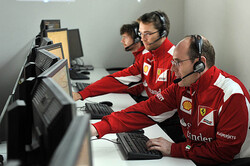


27/09/2013
NEWS STORY
 In the first of a two-part insight, Neil Martin reveals the workings of Ferrari's Strategic Operations, the 'remote' crew working at the team's Maranello HQ at race weekends. A scene replicated at all the top teams.
In the first of a two-part insight, Neil Martin reveals the workings of Ferrari's Strategic Operations, the 'remote' crew working at the team's Maranello HQ at race weekends. A scene replicated at all the top teams.
"A week before the event, we come up with a preliminary analysis with the aim of defining a scenario and to get a prediction of how the race could evolve," Martin told the team's website. "Normally, there are one or two strategies that could be considered workable. Then, at the end of the first two free practice sessions, we update our scenario with the information relating to the handling of our car and of our competitors, not just in preparation for the race but also for qualifying. On Friday, we also carry out many simulations to determine how the others will tackle the race, based on their strong points."
And on to Saturday...
"We begin by trying to analyse the data from the third free practice session in a hurry, so that we can calculate the cut off lap time predicted for Q1 and Q2, which is then adjusted during the afternoon session, also based on the real evolution of track conditions and the weather. After qualifying, once the grid positions are decided, we get back to running our simulations to understand what could be the positions in line with our potential and what ought to be our risk profile. We look at the possible scenarios regarding traffic and evaluate different strategy choices. A meeting specifically relating to strategy takes place at the track on Saturday evening and then, on Sunday morning the programmes are finalised, as well as the various options, with the drivers to be sure that everyone knows what needs to be done and what results can most likely be expected."
Asked whether it's all about number crunching or sometimes acting on instinct, Martin is under no illusion.
"At first, when I was the youngster who played with numbers, people with years of experience on the pit wall or senior team personnel were ready to cite criteria according to which, at a given track and in set conditions, the new methods were bound to fail.
"Atypical events, by definition occur now and again and these are the ones that tend to be remembered best, especially if they led to a bad result. By dint of repeating that if strategic decisions had been taken according to their ideas, the results would have been of a certain type - and having established that more often than not the predictions were right - then some people began to do an about turn. Let's say that a certain level of scepticism is always positive, because it helps to keep you on your toes, but an imperfect logic rarely takes up much of my time on a daily basis. Then, it's clear that there are imponderable events which wipe out the best predictions and the most accurate choices."
Asked how much data is required to have a good strategy simulation model and how many sensors are required to gather that data, Martin reveals: "It depends on the level of accuracy you want to achieve," explains Neil. "In theory and it might be surprising, you only need a bit of real time data: your lap time and that of your opponents. Then, if you have the times from all three sectors that go to make up a lap of the track, the result is more reliable. If you also have a GPS at 5 HZ for all the cars, then you can have enough Mb of data for each lap from your opponents, to which can be added the data from your car, which is obviously more detailed for a total of around 10Mb per car per lap."
Finally, asked if there is anything better than winning, the answer is instantaneous and exactly what one might expect.
"Obviously a one-two, but I don't think that's the answer you were looking for! Joking apart, I have worked in motor sport for 19 years and my mood on Sunday afternoon is now irrevocably linked to our performance on track. However, knowing that, as a team, we have done the best job possible over the whole weekend is equally important. Supplying clear information that's accurate and on time, about possible choices and their risks, meaning that the best possible decisions can be taken: that means we have done a good job."